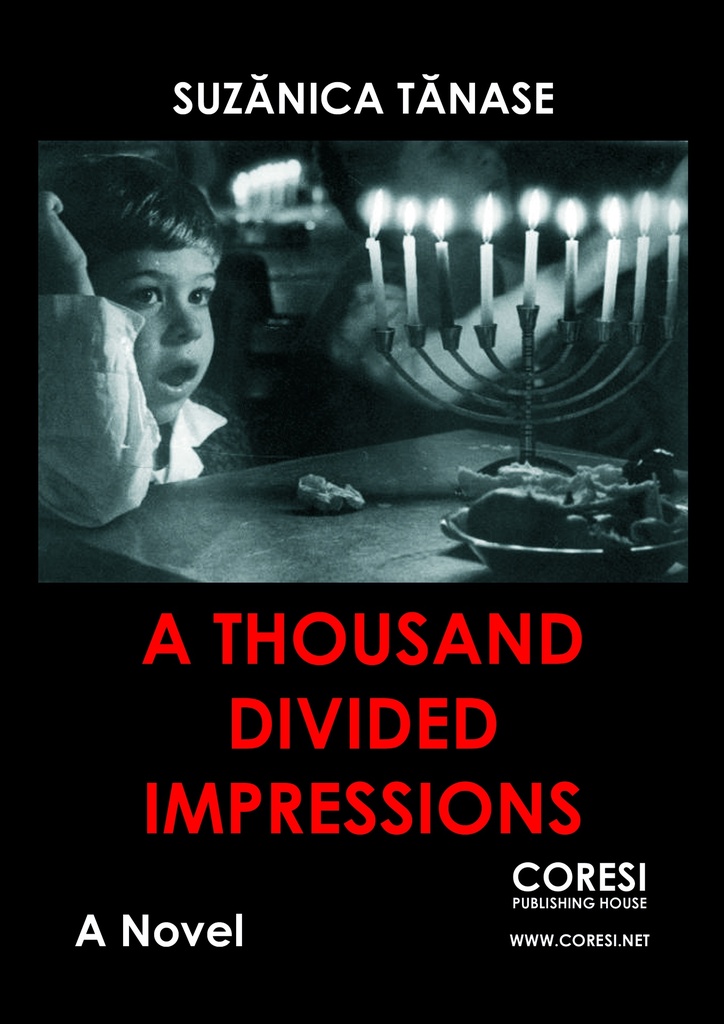A Thousand Divided Impressions. A Novel
Author: Suzănica Tănase
ISBN 978-606-996-357-9
I
If you live in Romania, please order the book using the shopping bag at this link:
Alternatively, you can send a message to coresi@coresi.net or call ++40722156408.
If you live in the United States, please order the book via this link:
If you live in Canada, please order the book via this link:
https://www.amazon.ca/dp/1092505652
If you live in the Germany or in Switzerland, please order the book via this link:
If you live in the Spain, please order the book via this link:
If you live in the Italy, please order the book via this link:
To download the Kindle digital edition of the book, please use this link:
To download the iBookSquare.ro digital edition of the book, please use this link:
http://ibooksquare.ro/Books/ISBN?p=978-606-996-358-6
To download the Google Play / Google Books digital edition of the book, please use this link: https://play.google.com/store/books/details/Suz%C4%83nica_T%C4%83nase_A_Thousand_Divided_Impressions?id=zCqQDwAAQBAJ
Suzănica Tănase published her first novel with ePublishers in 2014: Cap de lut (A Clay Head), signed with her maiden name, Suzănica Petrov: https://amzn.to/2Utc3KG.
Her second novel was published by Editura Berg in 2018: O mie de impresii divizate (A Thousand Divided Impressions), https://amzn.to/2G0cvb1.
The present book is the English version of Suzănica’s second novel, translated from Romanian by Adriana Crăciun and edited by Vasile Poenaru.
This is a short excerpt from this deeply disturbing novel:
“The news of Struma’s torpedoing got late to Hanna, like an echo of a hidden thought, to resonate then with thousands of trumpets’ force in an endless cave.
She had worked for two years as a tutor with a family in Bucharest, a modest family, who instead of money offered her shelter and two hot meals a day, people who knew nothing about her and didn’t even want to know. It was unexpected luck after only a month of life lived like a dog’s, chased between shelters in abandoned buildings. She was found almost frozen in the street and brought by a stranger to a sanitarium in Piteşti. First, doctors thought she’d die of pneumonia, as it happened to all patients in the long, yellowish and sick room; they just disappeared like flies after a lifetime of only four days, but after a few weeks, Hanna seemed to recover and the persistent cough that was hers like an item of clothing, faded without leaving traces of final disease. Released from hospital, she went to the capital with recommendation from a nurse to a sad family, a single mother with five children. At that time, fear lived in each human gaze, and, as it was normal, Hanna, still weak, had little to say, just looking down. However, the woman waiting for her as last salvation welcomed her warmly, without curious questions and extravagant expectations. From the very beginning, they got along only gazing at each other, like two Siamese sisters who feel their pain from thousands of miles away, and only the children, with the naivety of their age, sometimes colored the bleak little rooms of the house.
Two years passed for her as integral part of a family that needed her presence so badly that she needed to forget her past. But forgetfulness is always episodic, and she read Struma’s news by chance in an old rumpled newspaper cleaning glasses with wrinkled scraps of paper. She held hands tight on the shards long after re-reading the lines, long after her warm blood got dry on the blown dress sleeve, concluding that Struma’s torpedoing date made no sense. Was it another Struma?
Somehow, she knew she remembered the exact boarding date, even after so long, and the fate of the ship in Bessarabia newspaper didn’t make sense. Maybe it was another Struma, she could hear herself thinking loudly, and her thoughts were like a fidget that doesn’t want to stop from concentric circles that give it life.
Then searches began, unanswered questions, fleeting news, even from elders in parks secretly gathering to speak politics. So she found out about Istanbul, about getting the ship out of Bosphorus Strait, about the torpedoing, and loss of nearly 800 lives. So she found out about her murder, her no escape, her future that made no sense. So she found out one more time the feeling of dying, being still alive.
In time, their tragedy became her burden, and fear of death completely disappeared, with precision of needle injecting poisonous lethal serum into tense arm muscle to paralyze the nervous system and eventually stop the heart. There was a time when she hoped for a few hours that the only one survivor was the dark boy who risked everything to take her home, but the name and the face staring back at her from the newspaper pages didn’t remind her of Lorian at all. David, the only person who survived Struma, a young man from Bucharest, of only eighteen, was the only Jew who got to America from Struma, the only one who could tell the world the secret of a horrible tragedy. And Hanna, with broken heart scattered around her in fragments impossible to fix, carried her pain with Sisyphus ambition, constantly and eternally.”
When the Soviets torpedoed the Struma ship, not far from Istanbul, almost 800 Romanian Jews—men, women, children—died: no chance of survival!
Read this book... and weep to honor their memory. And to learn that we should fight for humanity in every way we can.

![[978-606-716-087-1] Cap de lut](/web/image/product.product/46/image_128/%5B978-606-716-087-1%5D%20Cap%20de%20lut?unique=94279e5)